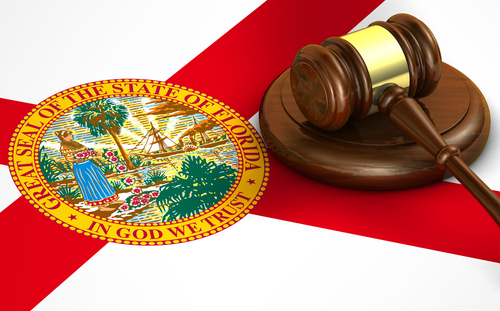Florida lawyer says she used trust account funds to avoid becoming homeless

An Orlando, Florida, lawyer accused of client trust account violations has said she used some settlement funds during the COVID-19 pandemic to avoid becoming homeless when she lost her primary job as a schoolteacher. (Image from Shutterstock)
An Orlando, Florida, lawyer accused of client trust account violations has said she used some settlement funds during the COVID-19 pandemic to avoid becoming homeless when she lost her primary job as a schoolteacher.
The Florida Supreme Court placed the lawyer, Natalie Renee Jones of Florida, on emergency suspension in a Sept. 16 order summarized by the Florida Bar News.
The Miami Herald covered the suspension and Jones’ explanation.
Hurricanes Helene and Milton are further compounding Jones’ troubles, Jones said in a motion for an extension of time to comply with the suspension order. The hurricanes have displaced Jones from her home and law office, and she has limited access to essential documents and records, she said.
The ethics investigation began when Bank of America notified the Florida Bar of an overdraft of about $2,400 in Jones’ client trust account in March, according to the Sept. 11 motion for the emergency suspension. The bar determined that the overdraft stemmed from Jones’ payment of fees to herself from trust account money two weeks before she deposited the settlement check.
The bar initiated an audit. It found shortages in the trust account ranging from $3,333 to $37,052 from December 2020 to June 2024, according to the suspension petition.
Jones told disciplinary authorities in a June letter that she used client settlement funds for personal expenses because “the alternative would have rendered my son and me homeless.”
The letter said Jones began working as a schoolteacher a year before the onset of the COVID-19 pandemic. She also began drafting demand letters for attorneys and took on two significant accident cases against Walmart and Lyft, as well as some smaller cases.
After the pandemic shut down schools and courts, Jones wrote, “I was without a steady income and in an exceptionally precarious situation.” Because her “finances were depleted,” she had to refer her two best cases to large litigation law firms.
When smaller cases settled, she said, she did not immediately compensate medical providers and used the money for living expenses.
In her answer to the petition for an emergency suspension, Jones said there was no threat to the public because all clients received their full settlement funds. Medical providers impacted by delayed funds were contacted and informed.
Jones said she is an attorney with a 30-year career that is “devoid of bar violations or complaints.”
Since the bar inquiry began, Jones said, she has taken a continuing legal education course on emotional resiliency, has sought counseling, and has listened to podcasts on managing client trust accounts.
Neither Jones nor her lawyer, Christopher L. Clark of the First Neighborhood Law Firm, immediately responded to an ABA Journal request for comment sent to email addresses used in the disciplinary case.



